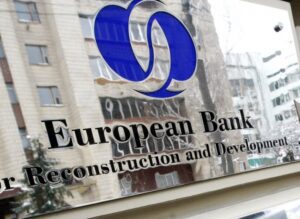
The European Bank for Reconstruction and Development (EBRD) has amended the agreement on the ongoing Dolinskaya – Nikolaev – Kolosovka Railway Electrification Project, which will allow additional use of part of the EBRD loan in the amount of EUR98.5 million to provide liquidity to finance critical needs of JSC “Ukrzaliznytsya” (UZ).
Finance Minister Serhiy Marchenko, EBRD Director for Eastern Europe and the Caucasus Matteo Patrone, and Ukrzaliznytsia Board Chairman Oleksandr Kamyshin signed the corresponding documents on Thursday, the Finance Ministry reported.
The repurposed portion of the EBRD loan will be secured by a guarantee from the French government or another G7 country.
“Damage and destruction of the railway infrastructure, loss of Ukrzaliznytsia’s rolling stock have a negative impact on ensuring the smooth operation of the society. Therefore, an increase in the EBRD loan to support the liquidity of Ukrzaliznytsia will help maintain the stability of its work in war conditions,” Marchenko commented on the agreement.
As reported, earlier this year, on June 10, similar amendments to the agreement were already signed, according to which EUR50 million was directed to support the liquidity of Ukrzaliznytsia. Thus, the total volume of the EBRD loan for the liquidity of UZ reached EUR 148.5 million.

The European Bank for Reconstruction and Development (EBRD) will provide transmission system operator NPC Ukrenergo with EUR97.3 million in support of liquidity in the face of Russia’s military aggression.
“The EBRD and the Ukrainian authorities have agreed to change the purpose of the remaining EUR97.3 million from an existing loan to Ukrainian electricity transmission system operator Ukrenergo. The new purpose of the funds is to maintain the company’s liquidity,” the bank said in a press release on Friday.
It clarifies that in this way the bank will repurpose part of the EUR149 million loan provided in 2019 to support liquidity to modernize key elements of the electricity transmission infrastructure in order to support the stable operation of the system and synchronize with European electric networks, as well as to help Ukraine bring its legislation and operating principles in accordance with the requirements of the Third Energy Package of the EU.
“Due to the war, Ukrenergo has urgent liquidity needs, so the company has asked to repurpose the undrawn funds. This liquidity support from the EBRD will ensure the stable operation of the Ukrainian energy system, nuclear and renewable energy generation capacities, as well as the supply of electricity to industrial consumers and population,” the release notes.
The EBRD notes that during the war, the company faced significant customer defaults and a 30% drop in electricity consumption, resulting in a loss of revenue.
At the same time, they specified that up to half of EUR97.3 million would be guaranteed by a sovereign donor from the G7 countries.
The bank noted that the support provided is part of the EUR1 billion investment it promised before the end of the year to support the Ukrainian economy on the terms of risk-sharing with donors and partners.
The release recalls that in May Ukrenergo already received EUR50 million as part of the reassignment of a previously granted loan.
Ukrenergo reported that these funds were used to repay debts in the ancillary services market, and also noted that it was counting on new reprofiling of loans to support liquidity, in particular, to repay debts in the balancing market.
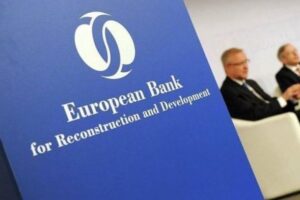
The European Bank for Reconstruction and Development (EBRD) will allow NPC Ukrenergo to change the purpose of a EUR50 million loan for emergency liquidity support, and the European Fund for Sustainable Development will provide a guarantee to cover the first losses.
“This support is part of the EUR1 billion that the EBRD plans to implement in Ukraine this year in cooperation with donors and partners,” the bank said in a press release on Wednesday.
The EBRD notes that EUR50 million will ensure a stable electricity supply in the country, whose economy was significantly negatively affected by the Russian military invasion in February.
“At a time when Ukrainians are resisting Russian aggression, it is important to ensure proper electricity supply in their country, and therefore support the critical role of Ukrenergo. We are also preparing support with the EBRD for other important areas of the Ukrainian economy, which will be provided in the coming weeks , in particular to meet the liquidity needs of the railway and pharmaceutical industries,” Valdis Dombrovskis, Executive Vice President of the European Commission, is quoted in the bank’s message.
He joined EBRD President Odile Renaud-Basso to sign a European Fund for Sustainable Development (EFSD) guarantee on the loan, which will reduce the bank’s credit risk in the current war conditions, the release said.
According to him, Ukrenergo’s support is part of a total EUR1 billion support that the EBRD plans to implement in Ukraine this year in cooperation with donors and partners. In order to meet the most urgent needs of Ukraine, the bank has identified five priority sectors of the Ukrainian economy: trade finance, energy security, vital infrastructure, food security (providing liquidity through banks for farmers for the spring planting campaign, as well as for agricultural companies and grocery retailers), and maintaining liquidity for pharmaceutical companies.
As reported, in July 2019, the EBRD agreed to provide Ukrenergo with EUR149 million to upgrade key elements of the electricity transmission infrastructure to support system stability and synchronization with European electricity grids, as well as to help Ukraine bring its legislation and operating principles in line. with the Third Energy Package of the EU. This loan has been partially disbursed.
Following a Russian-led war, the EBRD and Ukraine agreed to change the purpose of part of an existing loan for emergency liquidity support.
The EFSD is the financial mechanism of the EU’s External Investment Plan, which provides support for investment in Africa and the EU’s partner countries.
The EBRD immediately condemned the Russian invasion of Ukraine on February 24 and promised to stand with Ukraine. On April 4, the Bank’s Board of Governors voted to suspend indefinitely Russia’s and Belarus’ access to EBRD financing and technical assistance. The bank is closing its offices in these two countries. In addition to the EUR2 billion resilience package, the EBRD has pledged to help finance the recovery of Ukraine when conditions permit/
All EBRD investments in Ukraine under the resilience package for Ukraine and neighboring countries affected by the war will involve risk sharing with partners.
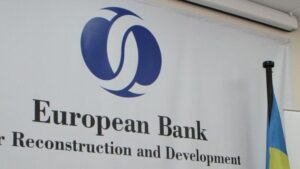
The European Bank for Reconstruction and Development (EBRD) has approved a framework program of up to EUR2 billion under the EBRD’s Sustainability Package, the bank’s broad strategic approach in response to Russia’s war against Ukraine.
“The framework program will use various types of financial instruments for private clients, sovereigns, municipalities, municipal companies and other state-owned enterprises and financial intermediaries (including state-owned banks) in Ukraine and neighboring countries affected by the influx of Ukrainian refugees,” the message says. bank website on Thursday.
According to him, the Board of Directors made a decision on April 4. He included Bulgaria, Croatia, the Czech Republic, Estonia, Hungary, Latvia, Lithuania, Moldova, Poland, Romania, Slovenia and Slovakia among the affected countries.
Subprojects will be provided at the expense of the usual resources of the bank, including its financing under the guarantees of donors, the report specifies.
The overall goal of the program is to help support service delivery and protect business activity in Ukraine and affected countries, with the ultimate goal of preserving livelihoods, the EBRD said.
“For Ukraine, the framework covers all sectors, with a particular focus on energy security, vital infrastructure, food security and pharmaceutical supply chain support,” the release notes.
In the case of the affected countries, refugee-related issues will be addressed, and will mainly cover areas such as energy security, municipal and national infrastructure, and liquidity through capital markets and financial intermediaries.
“As a result of the war in Ukraine, the market for liquidity and long-term financing is practically closed, and in the affected countries is significantly limited, as both local and international financial institutions tighten risk appetite. provides greater financial security driven by unprecedented adverse market conditions and heightened uncertainty,” the paper concludes.
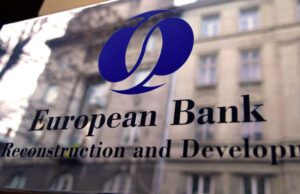
The European Bank for Reconstruction and Development (EBRD) will provide the first financing package to support Ukraine’s resilience in the amount of EUR2 billion.
“The European Bank for Reconstruction and Development (EBRD) has announced an initial EUR2 billion resilience package of measures to help citizens, companies and countries affected by the war on Ukraine. The bank has also pledged to do all it can to help with the country’s reconstruction, once conditions allow,” the bank said.
“Funding will be made rapidly available to support Ukrainian companies – for example, with deferred loans, liquidity support, and trade finance. Where possible, businesses will be helped to relocate so their work can continue,” it said.
“In addition, the bank’s Resilience and Livelihoods Framework will help in countries directly affected by inflows of Ukrainian refugees. Women, children and the elderly make up the majority of displaced citizens, and municipal authorities face huge challenges in managing the influx of people,” the report says.
“This package was endorsed today by the Bank’s Board of Directors and represents a first round of support. The EBRD had previously declared its unwavering support to Ukraine and its people, and condemned the aggression by the Russian Federation and Belarus,” according to the document.
“Once conditions permit, the EBRD will also be prepared to take part in a reconstruction program for Ukraine, to rebuild livelihoods and businesses; restore vital infrastructure; support good governance; and enable access to services,” it reads.
“It envisages working with international partners including the EU and U.S., as well as bilateral donors and other international financial institutions. It expects there to be a surge in investment in energy security, as well as an acceleration of decarbonization efforts,” the bank added.
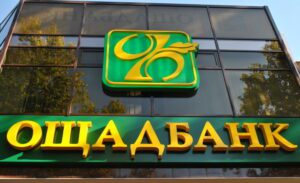
The Ministry of Finance and the European Bank for Reconstruction and Development (EBRD) have discussed the possibility of providing a subordinated loan to Oschadbank with option to convert the loan into equity shares.
This was reported in a press release of the Ministry of Finance on Wednesday following the meeting of Finance Minister Serhiy Marchenko and Deputy Minister Oleksandr Kava with EBRD Managing Director, Eastern Europe and the Caucasus (EEC) Matteo Patrone.
“During the meeting, the issue of providing Oschadbank with EBRD long-term financing in the form of a subordinated loan with option to convert the loan into equity shares was raised. The parties continue to work actively to implement the sale of a stake in Oschadbank. The key issues remain the completion of the preparation procedures and the accession of Oschadbank to the households deposit guarantee system,” the ministry said.
The parties also discussed potential joint projects with the EBRD for 2022, namely the reconstruction of the Lower Dniester irrigation system.
Earlier, the Ministry of Agricultural Policy and Food announced the readiness of the EBRD to invest EUR 90 million for the reconstruction of the main water pumping station of the Lower Dniester irrigation system (Odesa region).
As reported, in March 2021, Ukrgasbank received a loan of EUR 30 million from IFC with option to convert the loan into equity shares. The next step for the privatization of the bank is to find a financial adviser for the bank.